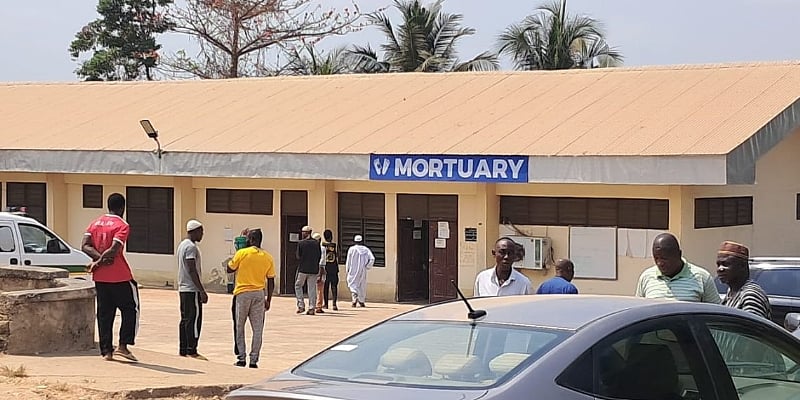The tragic incident at the Anglogold Obuasi Gold Mine on Saturday, January 18, 2025, underscores the complex and often volatile dynamics surrounding illegal mining, or “galamsey,” in Ghana. The confrontation, which claimed the lives of nine illegal miners and injured eight others, began late at night when a group of approximately 60 individuals attempted to forcibly enter the heavily secured Deep Decline area of the mine. Armed with a variety of weapons, including locally made rifles, knives, axes, and gas cylinders, the miners engaged in a firefight with military personnel guarding the facility, resulting in a devastating loss of life. The incident has sent shockwaves through the local community, leaving families grieving and raising serious questions about the efficacy of current security measures and the underlying socio-economic factors that drive individuals to engage in such risky endeavors.
The aftermath of the violent clash has been marked by somber scenes at the Obuasi Government Hospital, where families gathered to identify and claim the bodies of their loved ones. Medical personnel confirmed the deaths of nine miners, while eight others, who sustained injuries during the confrontation, were transferred to the Komfo Anokye Teaching Hospital for specialized treatment. Autopsies are being conducted to determine the precise cause of death for each individual, a crucial step in the investigative process. Following the completion of the autopsies, the bodies will be released to the police before being handed over to the families for burial arrangements, allowing them to begin the difficult process of mourning and healing.
In response to the violence, authorities have implemented heightened security measures throughout the Obuasi region. Reinforcements have been deployed to bolster security at all entry and exit points of the Anglogold mine, aiming to prevent further unauthorized access and potential clashes. The increased military presence reflects the seriousness of the situation and the government’s commitment to maintaining order and protecting critical infrastructure. Furthermore, as a precautionary measure, local public and private schools in Obuasi have been temporarily closed while the Ghana Education Service assesses the security situation and determines when it is safe for students and staff to return. This underscores the broader impact of the incident on the community, disrupting daily life and highlighting the pervasive sense of unease.
The sequence of events leading to the fatal confrontation paints a clear picture of the escalating tensions surrounding illegal mining in the area. According to reports, the group of approximately 60 illegal miners, armed and determined, approached the Deep Decline area of the Anglogold mine under the cover of darkness. When confronted by the military personnel stationed there, the miners reportedly opened fire, initiating the exchange that ultimately led to their deaths. While the military maintains that they acted in self-defense, returning fire only after being attacked, the incident raises questions about the use of lethal force and the potential for de-escalation tactics. The recovery of six pump-action BB cartridges from the site further underscores the level of preparedness and potential for violence exhibited by the illegal miners.
The fact that one soldier sustained a pellet wound, albeit a non-life-threatening injury, highlights the dangers faced by security personnel tasked with protecting the mine. While the soldier has since received medical treatment, the incident serves as a reminder of the risks involved in confronting armed individuals engaged in illegal activities. This incident also emphasizes the need for improved security protocols, better training for security personnel, and potentially, the exploration of alternative conflict resolution strategies to minimize the risk of future violent encounters. The incident underscores the complex challenges faced by both security forces and the local community in addressing the persistent issue of illegal mining.
The tragic loss of life at the Anglogold Obuasi Gold Mine has reignited the debate surrounding illegal mining in Ghana. While the government has implemented various measures to combat this illicit activity, the incident highlights the persistent challenges and the urgent need for comprehensive and sustainable solutions. These solutions must address the root causes that drive individuals towards illegal mining, such as poverty, lack of economic opportunities, and perceived marginalization. Furthermore, the incident calls for a thorough investigation to determine the exact circumstances that led to the confrontation and to identify any potential shortcomings in security protocols. Ultimately, a multi-faceted approach that involves community engagement, economic development initiatives, and strengthened law enforcement is crucial to effectively address the complex issue of illegal mining and prevent future tragedies.


